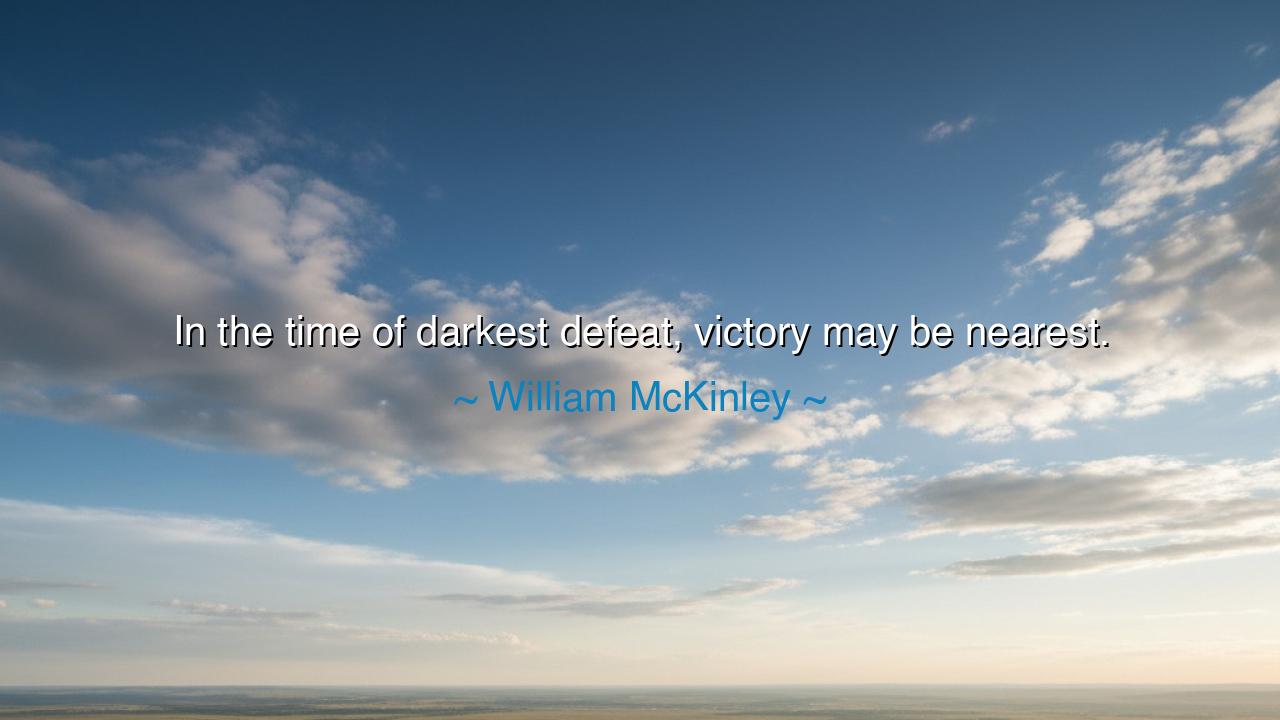
In the time of darkest defeat, victory may be nearest.






The words of William McKinley—“In the time of darkest defeat, victory may be nearest.”—shine like a flame carried into a cavern of despair. They speak to the mystery of struggle, to the paradox of life wherein the hour that feels most hopeless may conceal within it the seed of triumph. These words are no idle encouragement, but the reflection of a man who lived through battlefields and burdens, who knew that the human spirit often meets its greatest glory on the very edge of ruin.
To the ancients, it was well known that dawn comes only after the deepest night. The farmer must bury his seed beneath the cold soil, not knowing whether it will sprout, yet from that darkness life emerges. So too in the human heart: in moments of defeat, when all seems lost, we are stripped of illusions, and it is then that the hidden strength of the soul awakens. McKinley’s wisdom reminds us that what we call the end may be only the threshold of a new beginning, that victory often hides behind the veil of despair, waiting for those who endure one moment longer.
Consider the story of Abraham Lincoln. Defeated time and again in elections, scorned by many, and burdened by personal sorrows that would have broken lesser men, he might have surrendered to despair. Yet it was in his darkest hours, when all doors seemed closed, that he forged the resilience which would carry him to the presidency. And it was in the darkest defeat of a nation, torn by civil war, that his leadership brought forth the victory of unity and the end of slavery. Truly, his triumph was born from struggle; his victory was closest when defeat seemed overwhelming.
The battlefield itself testifies to this truth. In the winter of 1777, at Valley Forge, George Washington’s army shivered, starved, and many despaired of survival. To the soldiers, it seemed the revolution was lost; their cause lay in ruin. Yet from that crucible of suffering rose a hardened, disciplined force, which later marched to Yorktown and secured America’s independence. It was in the time of darkest defeat that the dawn of freedom was already breaking.
Beloved listener, the meaning of McKinley’s words is clear: despair is not the end, but the narrow gate through which one must pass to reach victory. When life presses heavily upon you, when failure seems final and hope seems extinguished, remember that you may be standing closer to triumph than ever before. The soul grows strongest when it is pressed hardest; the mountain peak lies just beyond the steepest climb.
What, then, shall we do in our own lives? When defeat visits you—whether in work, in love, or in the quiet struggles of the heart—do not cast away your resolve. Hold firm, breathe deep, and endure a little longer. Seek strength in small steps, in steadfastness, in the remembrance that countless others have walked through despair into victory. Write your failures not as endings, but as chapters in a longer story whose conclusion may yet be glorious.
Practical wisdom is this: when you feel crushed by loss, take action, however small. Rise each morning, even if the burden feels unbearable. Call upon your allies, for often victory is nearer than you alone can see. Remember that defeat is but a shadow, and shadows cannot exist without light. If you endure, the dawn will come, and with it, a triumph you could not yet imagine.
So let McKinley’s words echo in your heart: “In the time of darkest defeat, victory may be nearest.” Let them be a lamp in your night, a shield in your struggle, a trumpet to rouse your courage. For when the world tells you it is over, it may be that your greatest victory waits just beyond the horizon.






AAdministratorAdministrator
Welcome, honored guests. Please leave a comment, we will respond soon